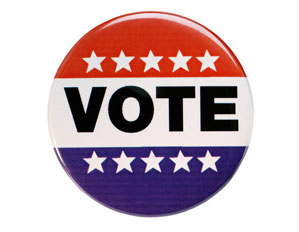Palm Beach County voters will be asked to decide two referendums during the Nov. 6 general election — one which could allow slot machines at the Palm Beach Kennel Club and one that continues the Palm Beach County Commission’s authority to grant special tax incentives to businesses.
Question No. 1 asks whether voters want to allow slot machines within licensed pari-mutuel facilities in Palm Beach County, subject to the restrictions of state law.
“Essentially, the county commission put this question on the ballot because they thought that there was an unfair disadvantage to our one pari-mutuel in Palm Beach County, the Palm Beach Kennel Club,” explained Palm Beach County Legislative Affairs Director Todd Bonlarron. “The bottom line is that in Miami-Dade and Broward counties, their pari-mutuels have the ability to have slots in them. The constitution allows those two counties, and those two counties only, to have slots in their pari-mutuels, which are dog tracks, horse tracks and jai-alai frontons.”
Bonlarron led a discussion of the two referendums at the Oct. 17 monthly forum hosted by County Commissioner Jess Santamaria.
Bonlarron said that commission members believe having slot machines will offer a big economic boost to an industry and an area of the county that needs some help, he said.
“It would also be about a $1.8 million influx into county coffers,” he added. “It would probably be tens of millions of dollars on the business side of what the Kennel Club might earn, and what that might correlate to redevelopment of their property, into jobs and other investments in the community.”
The down side of the issue is that some people don’t feel that gambling and the expansion of gambling is a good idea economically or morally, Bonlarron said. Nevertheless, it has developed an entrenched foothold in the state.
“Florida is a gambling state; we’ve got gaming just about everywhere,” he said. “You can go to the Seminole, Miccosukee Reservation, you can buy a lottery ticket, you can go on a cruise to nowhere, you can go on a cruise to somewhere, you can gamble anywhere you want in Florida from those venues. However, those who are opposed to this feel like Florida is a tourist destination with a Mickey Mouse image, and we don’t want to ruin that image.”
Along with gambling comes some other things that maybe aren’t so attractive, such as addiction to gambling and certain crimes, Bonlarron noted. “You’ve got to weigh those two options,” he said.
Even if the referendum is approved, slot machines in Palm Beach County would still have to be approved by the state legislature.
“It sends a message to the legislature, because ultimately they are going to be the ones to decide whether slots are going to be allowed,” Bonlarron said.
Mike Jones, past president of the Economic Council of Palm Beach County, now represents the Coalition for More Jobs, Better Schools and a Stronger Economy, which is posting “Vote Yes for Slot Machines” signs around the county. He was motivated by the need to help one of the county’s largest businesses remain competitive.
“What motivated me is the fact that this is the epitome of a family-owned business, a local business — the Rooneys have operated it for 40 years,” Jones told the Town-Crier. “The Kennel Club has been the center of travel and tourism in Palm Beach County for 80 years, and it just seemed to me that we ought to be taking care of local business and not encouraging potential customers to go down to Broward or Miami-Dade.”
Jones said the coalition is supported by 25 different business organizations and added that he is not aware of any organized groups opposing the question.
Question No. 2 asks whether the Palm Beach County Commission should be authorized to grant property tax exemptions to new businesses and expanding businesses if they are expected to create new full-time jobs.
“It’s an incentive that the board has used to recruit businesses and expand existing businesses in the area,” Bonlarron said. “There are some very strict contractual guarantees on how those exemptions work. They don’t just get the dollars. There are bonds that have to be in place. If someone doesn’t fulfill their obligation, they have to repay those dollars.”
He explained that this is an authority the commissioners currently have, but the authorization expires in 2014.
“If you want the county commission to be able to use this tool in the future, you’re going to have to re-up it so they can renew it,” Bonlarron said, adding that voters will have to weigh the potential job benefits against the possible revenue losses.
Assistant County Administrator Shannon LaRocque said the county’s ad valorem tax exemption program started in 2004.
“By state statute, those can only go on for 10 years, so we have to have a new referendum before that 10-year period runs out, or else we can no longer offer ad valorem tax incentives to businesses to expand or relocate in Palm Beach County,” LaRocque told the Town-Crier. “This will ask the voters to allow that program to continue for another 10 years.”
LaRocque said it gives the county flexibility when companies qualify under state law, which she said is very complex.
“We have to go through some significant exercises to make sure that they, in fact, qualify with state law. If they do, we evaluate every project on a case-by-case basis,” she said.
Criteria include how much capital they intend to invest, how many jobs they will create or retain and what the salaries are anticipated to be, she said.
The general election ballot is long, including many races and 11 statewide amendments. Bonlarron cautioned voters to be prepared and knowledgeable before going to the polls.
“Please tell your friends and neighbors to make sure that you know what you’re doing in advance because there’s going to be some long lines if people are going in and looking at that ballot for the first time,” he said.





